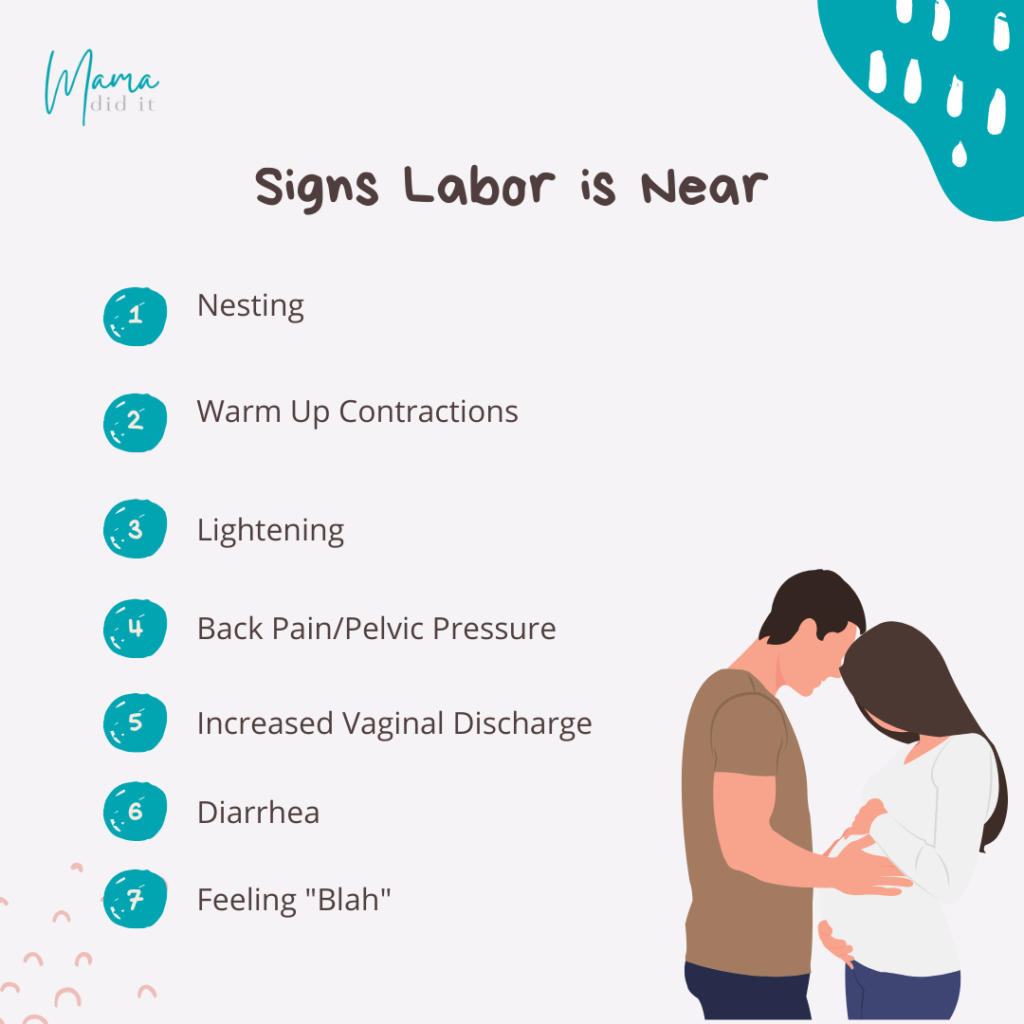Here are the signs your labor is near.
It was movie night. I had looked forward to this moment all day. After working a full-time day as a nurse and 38 weeks pregnant, I was ready to get off my feet. My husband and I sat down in our big chair with some popcorn and started Kung Fu Panda. (Intense, right?)
The contractions started. Thirteen minutes apart. Fourteen minutes apart. Ten minutes apart. I was recording them all, wondering if this could be the night I got to meet my baby boy. My hopes were high as I clocked each one. They continued through the whole movie but to my dismay fizzled out as I got up and got ready for bed.
One of the most common questions I am asked as a Spinning Babies® Certified Parent Educator and mother-baby nurse is, “How do I know when labor is near?” All of us expecting mama’s want to know how to know!

Signs Labor is Coming Soon
Your body begins to prepare for labor about one month before you deliver your baby. Some signs begin sooner than others, but they all indicate that you are doing exactly what you should be.
If you are a first-time mother, don’t be surprised if you watch your due date come and go without the delivery of your baby. I know this can feel disheartening, but many times your body isn’t quite ready for labor and needs a bit longer to prepare. Some studies show that babies themselves may actually trigger the start of labor when they are ready to live outside the womb. Keep yourself distracted to help these days pass. I promise your time will come!
Can you go into labor without signs?
Here’s the thing about labor signs, there is no set pattern. They don’t happen in consecutive order. One woman may pass her mucous plug three days before her labor begins. Another may pass it once she is already in her birthing center and is 6 centimeters dilated. More than likely, you are going to experience some labor signs before actually starting labor. It’s like looking in the rearview mirror. You may not notice the signs until you have already passed them by.
Signs Your Labor is Near
Nesting
Nesting is the term used to describe the way a pregnant woman feels the urge to organize, clean, and get things ready for the baby. I will never forget seeing an Amazon deal for a wood floor cleaning machine and impulse buying it so my floors would be clean enough for my baby to crawl on. Mind you, he wasn’t even born yet. This is a tell-tell sign of nesting and can start around one month before your baby arrives.
Braxton Hicks/Warm-Up Contractions
Braxton Hicks/ Warm-up contractions are our body’s way of preparing for childbirth. We are having these contractions all throughout pregnancy, but typically don’t feel them until around the third trimester. Towards the end of the third trimester is when they can get uncomfortable. Now is a great time to practice breathing exercises you will use with contractions during labor! Not sure if you have had any contractions? Read “What Does a Contraction Feel Like?”

Lightening
Lightening is usually described as “the baby drops.” It’s when your baby descends deeper into your pelvis. This typically happens 2-3 weeks before your baby is ready to be born. The beauty of lightening is that it frees up more space in your lungs and makes it easier to breathe. The downfall to this is our next symptom.
Back Pain and Pelvic Pressure
With your baby dropping deeper into your pelvis, it causes more pelvic pressure and lower back discomfort. Propping your feet up, taking a warm bath, or getting a massage can help offer relief during this time. Finding the right position to sit and sleep in can also work wonders.
Increased Vaginal Discharge
As you get closer to your due date, your cervix may begin to dilate and thin out (efface). This can cause increased vaginal discharge and possible “bloody show.” Your doctor or midwife will begin to perform weekly cervical exams after you are 36 weeks pregnant. This will also cause discharge that may be blood-tinged. Because the cervix is so vascular, it’s normal to see blood-tinged discharge following cervical exams or after sex. Increased vaginal discharge can be a sign that cervical change is taking place.
Diarrhea
With your baby sitting lower in your pelvis and causing increased back pressure, this can cause intestinal discomfort and diarrhea. Hormones may also be to blame as much is happening in your body during the final few weeks of pregnancy. Make sure to stay hydrated if you are experiencing diarrhea. If you have had diarrhea for more than 24 hours, give your doctor or midwife a call.
Other Signs- Can Labor Make You Feel Sick?
It’s normal to feel crampy days before or at the start of labor. Another sign labor is near is feeling overall “crummy.” You don’t really feel sick, but you may feel a twinge of nausea or decreased appetite. As Lucille Ball used to say, “Just blah! It’s a word for when you’re not really sick, but you’re just feeling lousy.” Rarely, women will vomit at the start of labor. Vomiting is much more common in the transition phase of labor when a woman’s cervix is 8-10 centimeters dilated.

Besides lightening, these labor signs tend to come and go the final weeks of pregnancy. They are all signs that your body is doing exactly what it should be doing, which is preparing you for the birth of your baby. Never hesitate to call your doctor or midwife if you are having a symptom you are concerned about.
You may also like What to Pack for the Hospital or Does the First Poop After Birth Hurt?
